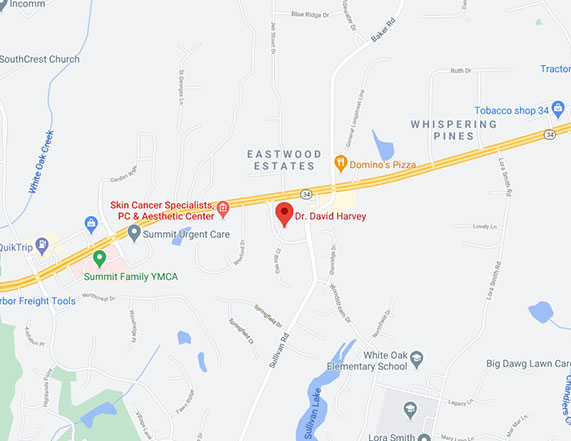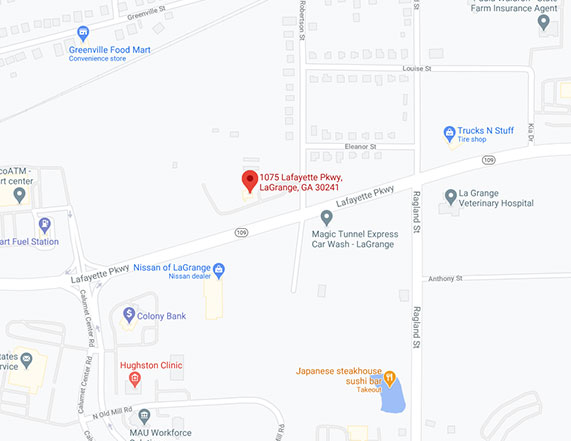Conveniently located to serve Newnan, Peachtree City and LaGrange
Click here to jump to:
Newnan Acne
Acne is a common skin disorder. It usually begins on the face or back. Earliest lesions are referred to as “blackheads” or whiteheads. Factors such as circulating hormones, stress and exposure to various environmental agents can precipitate an acne flare. Diet, is thought, in some instances to play a role acne development.
Who Is Prone to Acne?
Everyone can develop acne. Some acne conditions are triggered by hormones, medications, cosmetics, and environmental factors.
How Does The Acne Process Occur?
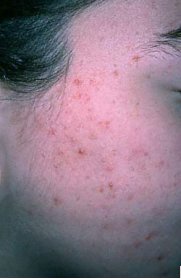
Acne Vulgaris (grade 2, blackheads, whiteheads and papules)
The four factors main which are thought to contribute to acne include:
- An increase in oil secretion rate.
- A change in oil composition.
- Abnormal growth and “stickiness” of the cells of the skin, which allow for acne inducing bacteria to overgrow.
- Release of male hormones.
Circulating hormones (which change in composition one week before a woman’s period) can increase or change the rate of sebum or oil production. This usually results in the adult female complaining of a flare-up of acne one week prior to menses. If a female or young child has excessive hair growth, abnormal menstrual cycle pattern, persistent headaches or other signs of masculinity, it is possible that an underlying medical condition such as Polycystic Ovarian Syndrome may be present. Birth Control Pills and/or Spironolactone may be useful treatment options in such instances.
Other items which can contribute to acne include:
- Friction
- Sweating
- Heredity
- Resistance Infections
- Environmental Agents (Greases, Solvents)
- Stress
- Exposure to Lanolin or Vegetable Oil Based Cosmetics
- Diet (high glycemic diet)
Related
Content
Patient
Review
“Dr. Harvey and his staff are excellent. He takes his time and really connected with my daughter about her acne issues. The rest of his staff are just very sweet. We are so happy to have found this practice. I highly recommend them.”
by Anonymous
What Is The Treatment For Acne?
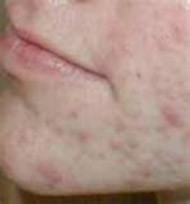
This depends on the nature of the disorder. Often topical or oral antibiotics can be used in combination with topical retinoids and oil controlling agents. The latter two medications will help decrease the amount of oil that is secreted and diminish skin cell adherence.
To remove blackheads, we recommend salicylic acid peels, microdermabrasion, acne surgery or photodynamic therapy (PDT). PDT employs a topically applied medication called “aminolevulinic acid”. This chemical is preferentially absorbed by oil glands and acne inducing bacteria. The medication is subsequently activated by a specific light source such as a blue light or laser. The net effect of this drug-light interaction is to destroy acne-causing bacteria and diminish oil gland secretion.
Finally one must remember that it is important to avoid picking or scratching acne lesions because scarring can ensue. It is common for pigmentation or redness to persist in areas where acne lesions were previously noted. In cases where cysts or nodules are present, a medicine called isotretinoin may be employed. To treat acne scars, fractional CO2 laser, dermasanding and fillers are wonderful options.
Alternative THERAPIES
Nutrition
Although some people with acne report that certain drinks and foods (particularly nuts) make their symptoms worse, there is no scientific evidence that any food (even chocolate) affects acne. It is possible that food allergies may play a role in adult acne. We advise our patients to avoid foods that appear to aggravate their symptoms. Supplements which have been used to treat acne include:
- Zinc (30 mg two times per day for a month, then 30 mg per day) — Some studies indicate that the mineral zinc may reduce the effects of acne.
- Niacinamide (as a 4% topical gel) — One study found that applying a 4% niacinamide gel to the skin two times per day for two months significantly reduced acne lesions. However, the study lacked a placebo, so it is hard to tell exactly how effective niacinamide might be.
- L-carnitine — Researchers in Greece showed that, among a large group of people, mild side effects from isotretinoin, e.g., dry skin, chapped lips, dry eyes, and nosebleeds can be diminished by taking L-carnitine.
- Vitamin A — has many of the same properties as other retinoids but with less side effects. Too much vitamin A can be toxic, so talk to us beforehand to determine the appropriate dose. Do not take vitamin A if you are pregnant or suffer from liver disease.
Herbs
Tea tree oil (Melaleuca alternafolia, 5% gel) — Applied topically, tea tree oil may help reduce bacteria on the skin, lessen inflammation, and reduce acne lesions. One study compared the effectiveness of tea tree oil gel with benzoyl peroxide lotion in 119 patients with mild-to-moderate acne. Patients in both groups improved, and those using tea tree oil reported less side effects (including stinging, itching, burning, and dryness) than those using benzoyl peroxide.
Our staff looks forward to helping you to answer any questions that you may have about acne. Remember, to follow through with your prescribed treatment plan to achieve optimal results. Sometimes this may result in your condition worsening temporarily. Though an instant “cure-all” is currently not available, we usually can effectively treat this common skin disorder. If you would like to schedule an appointment, please click here.
Perioral Dermatitis
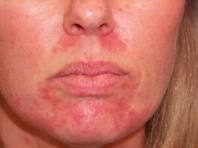
Perioral dermatitis tends to occur around the mouth. Most often it presents as a red, scaly rash. This condition can spread up around the nose and eyes as well. It is thought to be a combination disorder that is part acne, part seborrheic dermatitis and part eczema. The condition most often occurs in women.
There may be more than one cause of perioral dermatitis. One common exacerbating factor is the prolonged use of topical corticosteroid creams and nasal sprays. Moisturizers are another common contributing factor. Treatment involves the avoidance of these precipitating factors and prescription oral antibiotics which are taken for at least eight weeks. Earlier discontinuation of the antibiotic can result in a rebound flare of the disease.
If you have any questions and would like to contact our office to learn about acne products or to schedule an evaluation or treatment , please click here.










